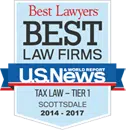#h2-blog{text-align:left!important; font-size:24px} Court Allows IRS To Serve Summons To John Doe For Cryptocurrency Usage #h2-blog{text-align:left!important;…
Supreme Court Upholds IRS Authority To Issue Summons In Specific Collection Cases
Last week, the U.S. Supreme Court unanimously ruled in favor of the IRS, upholding the agency’s authority to issue summons without prior notice in some situations. Although this authority is limited to specific collection cases, it sets a precedent for IRS power in specific tax cases.

IRS Obligation To Provide Summons Notice
According to IRC §7609(a)(1) and IRC §7609(c)(2)(D), the IRS is obligated to provide advance notice to taxpayers who are identified in a summons, with exceptions for summonses that are issued in aid of collection. The Supreme Court indicated in their statement that “the IRS may issue summonses both to determine whether a taxpayer owes money and later to collect any outstanding liability. When the IRS conducts an investigation for the purpose of “determining the liability” of a taxpayer, §7602(a), it must provide notice, §7609(a)(1). But once the Service has reached the stage of “collecting any such liability,” §7602(a) — which is a distinct activity — notice may not be required, §7609(c)(2)(D).”
Polselli v IRS
Polselli v IRS was heard before the Supreme Court and examined whether the exception to the summons notice requirements applied when the delinquent taxpayers no longer possesses any legal interest in the accounts or records that were subject to summons, as was the case with Mr. Polselli.
Chief Justice Roberts noted that a “straightforward reading of the statutory text supplies a ready answer: The notice exception does not contain such a limitation.” The Court’s opinion further noted that Congress once had the opportunity to add a provision to the Tax Code in these types of circumstances, but chose not to.
Supreme Court Rules In Favor Of the IRS
The petitioner provided multiple arguments in favor of the Tax Code exceptions, including that the provision was designed to safeguard the privacy of the taxpayer. They also argued that an absence of summons notice raises privacy concerns. However, the Court interpreted a straightforward reading of the law and upheld the scope and authority of the IRS to issue summonses in accordance with Tax Code, concluding that Poliselli v IRS was not the right case to use to challenge the authority of the IRS in this area.
Retain The Services Of Arizona’s Trusted Tax Attorney Firm
Every taxpayers knows that dealing with the IRS is stressful. If you’re facing pressure or prosecution from the IRS, are seeking innocent spouse relief, have concerns about the taxation of your cryptocurrencies, or need expert witness testimony, schedule your confidential consultation with Silver Law, PLC. Our attorneys utilize their decades of experience in tax law, along with their expertise as former IRS employees, to safeguard your rights through ethical but aggressive representation. Silver Law, PLC, stands ready to protect your interests while providing trustworthy legal advice for any tax controversy that you may be facing. Let us provide the guidance you need for all of your tax complications. Contact us today!

Email: lchapman@silverlawplc.com
Website: taxcontroversy.com
Arizona Location
7033 E. Greenway Pkwy, Ste 200
Scottsdale, AZ 85254
Office:480-429-3360
Nevada Location
410 South Rampart Blvd, Suite 390
Las Vegas, Nevada 89145
Office: 702-318-7130
Henderson Location
2470 Saint Rose Parkway Suite
207 Henderson, NV 89074
San Diego Location
1373 Grand Avenue,
San Diego, CA 92109
















Leave a Reply
You must be logged in to post a comment.